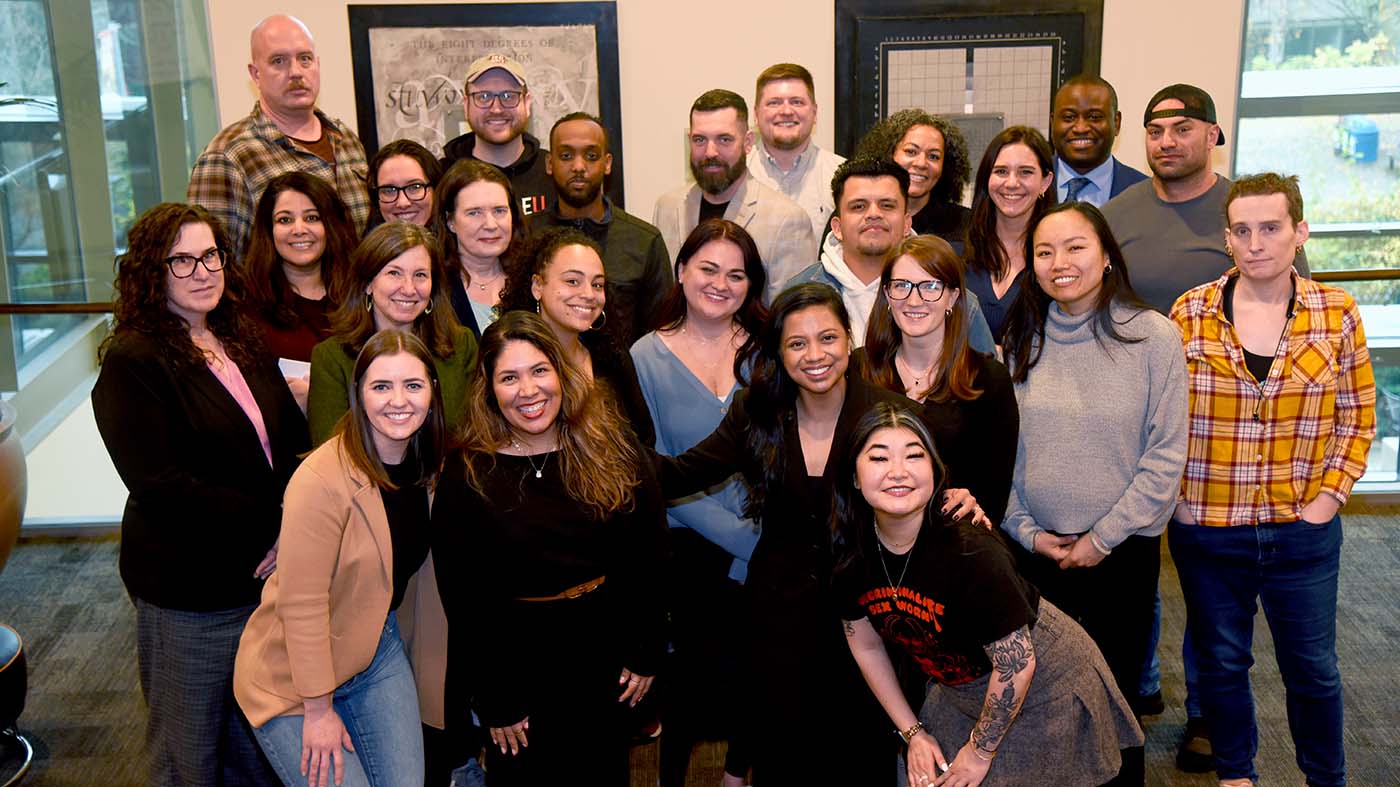This month, 35 Seattle University School of Law students — who hail from four states around the country and work in a variety of fields, from law enforcement to social work to human relations — are expected to graduate with law degrees that many of them once thought were impossible to attain.
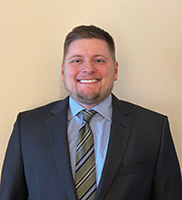
They comprise the first-ever graduating class of the Flex JD Program — launched 3.5 years ago in fall of 2021 — with a hybrid-online structure, in which most coursework is completed virtually. It is designed for students who cannot attend traditional full-time JD programs because they must work, have family commitments, or live far from a law school in another city or state.
Bradley Buchanan ’24, an accountant from Kentucky with five children, faced each of these challenges. It was going through the fostering and adoption process with his husband that inspired him to become an attorney.
“I wasn’t in a position to quit my job and go to law school full-time,” he said. “If I didn’t find this program, law school might not have been an option.”
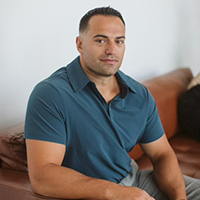
Nicholas Briggs ’24 of Spokane had always wanted to attend law school but did not believe he had a realistic path to do so.
“I was thinking it wasn’t going to be possible while working full-time,” said Briggs, who has worked as both a firefighter and a police officer over the past 20 years. “Then I found Seattle U Law, and it seemed like a match made in heaven. I thought, ‘This is meant to be.'”
One of the Flex JD Program’s goals is to make legal education accessible to people who live in areas that are not near law schools and have few practicing lawyers as a result. The hope is that graduates will stay in their home communities to practice law and provide critical legal services.
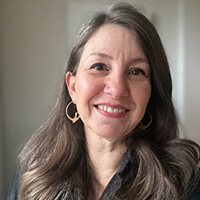
This is the plan of Heather Malcolm ’24, an HR consultant who lives in rural Skagit County, north of Seattle.
“I love Skagit Valley and was hoping to stay here. People say Skagit and Whatcom Counties are legal deserts,” she said. “I want to do something related to public interest, so I like the idea of entering an area without as many resources.”
Flex JD classes are held through Zoom every evening, Monday through Thursday (including during the summer). This was ideal for Seattle resident Georgia Burns ’24, who gave birth to her first son just a few months before classes began and wanted to be home with him during the day, while her husband is at work.
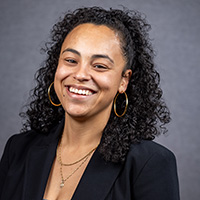
“I wasn’t prepared to have to leave my son as soon as he was born,” said Burns, who bore a second son since starting her legal education. “I’ve really appreciated the flexibility. A lot of us are parents, everyone has stuff going on during the day. It fits my lifestyle well.”
Mary Palmer ’24, who lives in Shoreline and works in aviation insurance, noted that classes can fall during evening commute hours for those with a 9-5 schedule, but she and her peers have gotten resourceful and attended classes on their phones while parked in their cars.
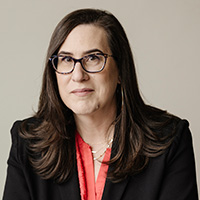
“The flexibility has made it easier,” Palmer said. “We can have class wherever we are.”
When the pandemic imposed mandatory social distancing, remote instruction proliferated. Just like students, faculty adjusted to this new normal.
“It’s been rewarding to see folks stepping up, enjoying the experience, and passing it onto their colleagues,” said Professor Brooke Coleman, vice dean for Academic Affairs, who oversees Flex JD.
Professors are fully dedicated to each student’s success. They often stay online for chats after virtual class sessions and make themselves available at other times to fit students’ irregular schedules.
As a Snohomish County Sheriff’s deputy on the county’s bomb squad, Chris Johnson ’24 must respond at a moment’s notice if there is an emergency.
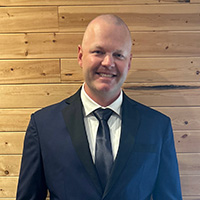
“Professors were very willing to work with me and make sure I could get the pieces I needed from a missed portion of a class,” he said.
Despite the virtual classroom environment, students have readily bonded, both online and in person. They regularly connect through group chats by sharing words of support and personal news about marriages, births, and even losses.
“I have made lifelong friends,” Buchanan said, while Palmer described the group as “tight-knit.”
Five in-person weekends per year, at which attendance is mandatory, have also provided social opportunities, where students share meals between classes and often get together in the evenings.
“Our program is different than those at other schools because we require these in-person weekends,” said Assistant Dean for Academic Affairs Kelli Rodriguez. “It’s really impactful in creating community.”
Despite the remote nature of the program, students have found virtual ways to get involved on campus. Malcolm co-chairs the Planning Committee for the 2025 Access to Justice Conference, was a member of the Seattle Journal for Social Justice and Moot Court Board, and has tuned in through Zoom to the Access to Justice Institute’s Social Justice Mondays.
At May Commencement, seven Flex JD students who completed their studies in six semesters became the first-ever graduates of the program.
After graduation in December, the Flex students will continue preparing for the bar exam and consider new career opportunities. Burns, who previously worked as a case manager for King County’s Law Enforcement Assisted Diversion Program, will return to work for the county, but now as a public defender.
“My previous role was more of a social work role, but I’m more interested in legal advocacy,” Burns said. “Being a public defender lets me still help clients and make changes. My hope is that as a public defender, I will be able to make the difference I want to make.”
Johnson, who is a veteran, has also determined his next step — he will return to the military as an officer for the highly selective Judge Advocate General (JAG) Corps with the U.S. Air Force.
“The Flex Program allowed me to be full-time at work and have all these other experiences. Doing all of that while going to school, with the challenges that presented, along with writing samples from a great writing school, really helped in the small window of getting selected for JAG,” Johnson said. “Absent the Flex Program, that wouldn’t have been possible.”

